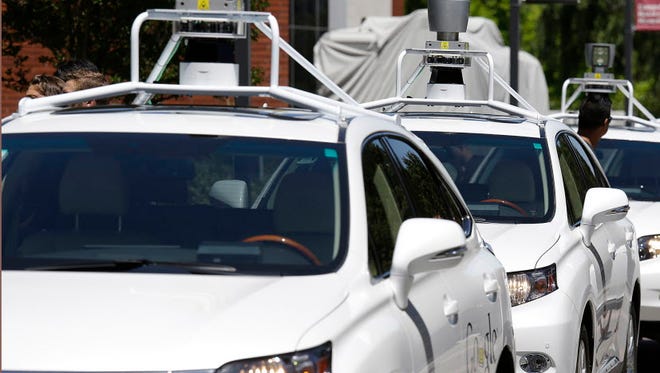On self-driving cars, proceed with caution: Our view
Technology holds promise and peril.
When Ford President Mark Fields announced this month that his company would produce a driverless car — with no steering wheel and no gas pedal — in five years, he did not mince words. Driverless cars, he said, “would have as significant an impact on society as Ford’s moving assembly line did 100 years ago.”

A truly driverless car by Labor Day weekend of 2021 seems like a tall order. But autonomous technologies are already being added to existing cars at breakneck speed, and the early data suggest they are making cars safer. The much-publicized fatal accident in May involving a Tesla on "autopilot" was the first in 130 million miles traveled by other Teslas using the same, poorly named function.
The prospect of driverless cars poses all sorts of intriguing possibilities. Those who are sight-impaired or otherwise unable to drive would find new mobility. Traffic flows could be better managed as cars would be automatically routed to the least congested routes. And people with modest automotive needs could simply summon rides when needed, rather than wasting money on cars that spend much of their time parked in driveways.
For these and other reasons, Washington should resist the temptation to slap onerous regulations on a promising industry. At the same time, producers of driverless cars would be well advised to proceed with caution. Going too far, too fast will inevitably create a backlash against the technology.
NHTSA creates safety vacuum: Opposing view
For years, those concerned about how the world around them is changing have focused most of their ire on trade and immigration, rather than on the creative destruction of technology. With cars, that might be shifting. Driverless vehicles would go considerably further in upsetting the existing order. Taxi, Uber and Lyft drivers would join the ranks of the aggrieved, as would long-haul truckers.
Moreover, no matter what the data say, many Americans equate driverless cars with a reduction in safety. They generally trust their own instincts and judgment, and reason that if they are in control they can limit their risks. Pretty much the opposite is true. An estimated 94% of accidents are caused by human error, often involving drivers who are distracted, tired or inebriated.
Perhaps the biggest hurdle that carmakers face is the unexpected. No one really knows what traffic would be like when significant numbers of driverless cars are on the road. Most driverless cars have been programmed to be as conservative and prudent as a grandmother going to church. Most humans at the wheel tend to be more assertive. That combination could make for an unwieldy mix on America’s roads.
Driverless cars have a lot going for them. But automakers and regulators need to think carefully about how quickly, and under what circumstances, they should be brought to market. And society as a whole needs to ponder the question: How much safer is safe enough?
USA TODAY's editorial opinions are decided by its Editorial Board, separate from the news staff. Most editorials are coupled with an opposing view — a unique USA TODAY feature.
To read more editorials, go to the Opinion front page or sign up for the daily Opinion email newsletter. To respond to this editorial, submit a comment to letters@usatoday.com.